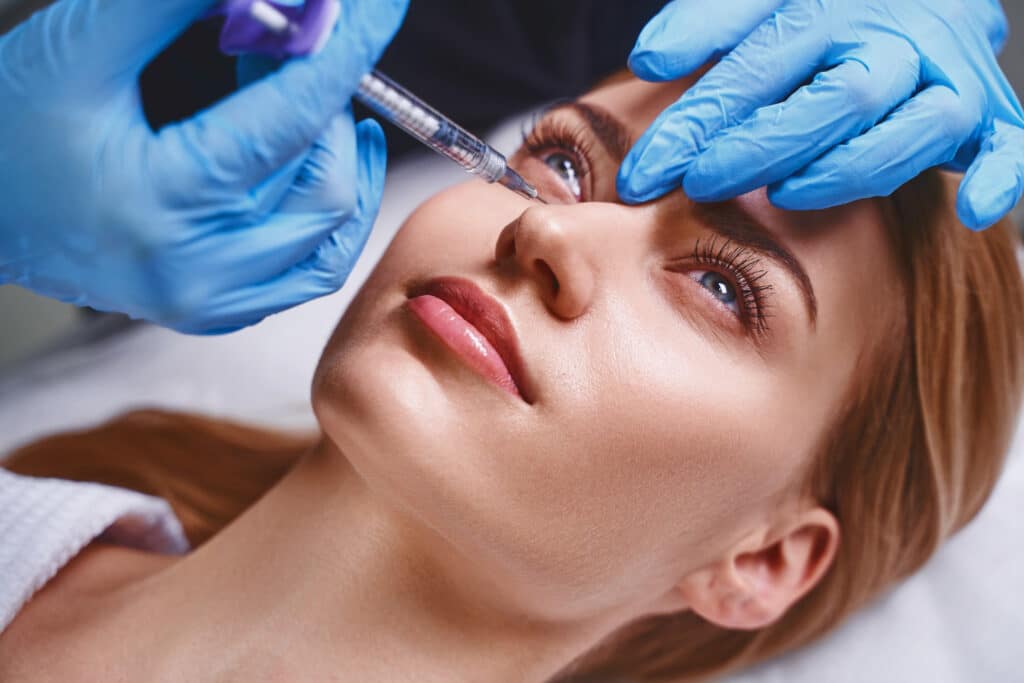As we age, the delicate skin beneath our eyes can lose its elasticity and volume, leading to a tired, aged appearance. Under-eye fillers have become an increasingly popular cosmetic treatment for those seeking to rejuvenate their look without invasive surgery. This guide provides an in-depth look at Under Eye Fillers in Dubai, exploring their benefits, the procedure, potential side effects, and more.
What Are Under Eye Fillers?
Under eye fillers are injectable treatments primarily made from hyaluronic acid, a naturally occurring substance in the body that helps retain moisture and add volume. These fillers are designed specifically for the delicate under-eye area to restore lost volume, smooth out fine lines, and reduce the appearance of dark circles.

Types of Under Eye Fillers
Hyaluronic Acid Fillers: The most common type of filler, hyaluronic acid fillers are known for their safety and effectiveness. They provide immediate results and can last between six months to a year, depending on the product and individual factors.
Calcium Hydroxylapatite: This type of filler is thicker than hyaluronic acid and provides longer-lasting results. It stimulates collagen production but is less commonly used under the eyes due to its density.
Poly-L-lactic Acid: This filler works gradually to restore volume and stimulate collagen production. While it can be effective, it requires multiple sessions and may not be suitable for everyone.
Benefits of Under Eye Fillers
Immediate Results
One of the most appealing aspects of under eye fillers is the immediate improvement in appearance. Patients often notice a brighter, more youthful look right after the treatment, with fullness returning to hollow areas under the eyes.
Non-Surgical Solution
Under eye fillers are a non-invasive alternative to surgical options, such as blepharoplasty. The procedure requires minimal downtime, allowing individuals to resume their daily activities quickly.
Versatile Treatment
Fillers can be customized to meet individual needs. Whether you want to address hollowness, dark circles, or fine lines, the treatment can be tailored to achieve the desired results.
Safe and Effective
When administered by a qualified professional, under eye fillers are considered safe with a low risk of complications. Hyaluronic acid fillers are biocompatible and can be dissolved if necessary, offering peace of mind for patients.
The Procedure: What to Expect
Consultation
Before undergoing under eye filler treatment, a consultation with a qualified practitioner is essential. During this session, you can discuss your concerns, medical history, and aesthetic goals. The practitioner will assess your under-eye area to recommend the best filler for your needs.
The Injection Process
Preparation: The practitioner will cleanse the area and may apply a numbing cream to minimize discomfort during the injections.
Injection: Using a fine needle, the filler is injected beneath the skin in small amounts. The practitioner may massage the area to ensure even distribution.
Aftercare: After the procedure, you may be given specific aftercare instructions to follow to maximize the results and minimize swelling or bruising.
Duration of the Procedure
The entire procedure typically takes around 30 minutes to complete, making it convenient for those with busy schedules.
Recovery and Aftercare
While under eye fillers have minimal downtime, it is essential to follow proper aftercare to ensure optimal results.
Post-Procedure Tips
Avoid touching or rubbing the treated area for at least 24 hours to prevent complications.
Stay upright for a few hours to reduce swelling.
Limit strenuous activities for a couple of days post-treatment.
Use cold compresses to alleviate any swelling or discomfort.
Expected Side Effects
Common side effects of under eye fillers may include:
Swelling
Bruising
Redness at the injection site
Asymmetry or irregularities
These effects usually subside within a few days. Serious complications are rare but can occur, highlighting the importance of choosing a skilled practitioner.
How Long Do Under Eye Fillers Last?
The longevity of under eye fillers varies based on several factors, including the type of filler used, individual metabolism, and lifestyle choices. Generally, hyaluronic acid fillers last between six months to a year. Regular maintenance treatments can help prolong results.
Choosing the Right Practitioner
Selecting a qualified and experienced injector is crucial for achieving safe and effective results. Consider the following when choosing a practitioner:
Credentials: Ensure the injector is licensed and has specialized training in cosmetic injectables.
Experience: Look for someone with a proven track record in administering under eye fillers.
Reviews: Check patient reviews and before-and-after photos to gauge the injector's skills.
Alternatives to Under Eye Fillers
While under eye fillers are popular, there are alternative treatments available for improving the appearance of the under-eye area. These include:
Topical Treatments: Creams and serums that contain ingredients like retinol, vitamin C, and peptides can help improve skin texture and reduce dark circles over time.
Laser Treatments: Laser therapies can stimulate collagen production and improve skin elasticity, helping to reduce fine lines and wrinkles.
Chemical Peels: These treatments can help improve skin tone and texture by removing dead skin cells and promoting cell turnover.
Surgery: For those with significant bags or excess skin, surgical options like blepharoplasty may be recommended.
Conclusion
Under-eye fillers offer a safe, effective, and non-invasive way to brighten and rejuvenate the appearance of tired eyes. With immediate results and minimal downtime, they have become a popular choice for many seeking to enhance their facial aesthetics. However, it is crucial to consult with a qualified practitioner to discuss your specific needs and expectations. By understanding the benefits, procedures, and aftercare associated with under-eye fillers, you can make an informed decision and achieve the youthful, refreshed look you desire.
